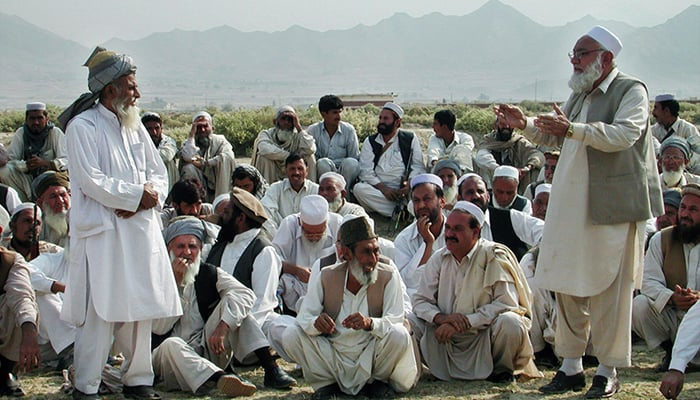Jirga injustice
Pakistan keeps running around in circles of horror, whether in politics or in crimes against its own citizens. In a terrifying throwback to 2012, reports say that a young girl was allegedly murdered and another rescued by police in a case involving a viral video in the Barsharyal village of Kohistan, Khyber Pakhtunkhwa (KP).
The girl was allegedly killed on Sunday by her own family on orders issued by a local jirga. The video and photos, which went viral on social media a few days ago, also featured boys who are said to have since gone into hiding. According to reports, the videos and photos were edited – and thus fake. Despite this, the jirga decreed the girl be killed.
This story of horror is much too grim a reminder of what happened back in 2012 in Kohistan when three brothers were killed after a video in which their two siblings were seen dancing and five women were seen clapping went viral.
The women seen in the video were also allegedly killed by their brothers and fathers in 2012 but their bodies were never found as they were reportedly dumped in the local river. A commission of the Supreme Court constituted on the petition of Afzal Kohistani was probing the murder of the women seen in the 2012 video. Unfortunately, Afzal Kohistani was assassinated along with his three brothers. Even more tragic was how the Peshawar High Court (PHC) last month set aside the conviction of the three accused of murdering the five women. They had been given life sentences back in 2019.
Caretaker Chief Minister of Khyber Pakhtunkhwa Justice (r) Arshad Hussain Shah has taken serious notice of this latest case of jirga ‘honour killing’ in Kohistan and directed the authorities concerned for immediate inquiry of the incident. However, let’s not forget that this is a problem that will not go away unless perpetrators of such heinous crimes are brought to justice. In the complex tapestry of Pakistan’s socio-cultural landscape, the phenomenon of honour killings sanctioned by tribal jirgas has continued to cast a dark shadow for decades now. The existence of jirga-sanctioned ‘honour killings’ – a misnomer in itself – undermines the principles of a fair and just legal system, reinforcing a parallel system that operates outside the purview of the state. The persistent occurrence of these dishonourable killings, often condoned and even orchestrated by these informal tribal councils, reflects a deep-seated challenge that Pakistan must confront head-on. By condoning such acts, jirgas and their benefactors send a chilling message to society, signaling that extrajudicial violence is an acceptable means of enforcing societal norms.
The state of Pakistan must strengthen its legal framework to eliminate loopholes that allow perpetrators to escape justice. Stricter enforcement of existing laws is imperative. Simultaneously, efforts should be made to educate communities about the inherent human rights of individuals and the importance of gender equality. There must also be a concerted effort to reform traditional jirgas and bring them in line with the principles of justice and human rights. It is also important for all political parties to make sure that their stance on these issues should be made clear. With elections just around the corner, the public has a right to know what their political representatives have done when they were in power and what is their stance on issues related to violence against women. Where do political parties manifestoes stand on this issue? Pakistan at the moment stands at a crossroads where it must decide whether to uphold the principles of justice, equality, and human rights or continue down a path marred by violence, discrimination, and injustice. Addressing jirga-sanctioned honour killings is not just a legal imperative; it is a moral duty that the nation owes to its citizens, especially its women who continue to bear the burden of family, tribal, or societal ‘honour’.
-
 Meghan Markle’s Family Shares Important News Amid Estrangement
Meghan Markle’s Family Shares Important News Amid Estrangement -
 BAFTA, BBC, And Tourette’s Advocate John Davidson Issue Formal Statements For His Onstage Slur
BAFTA, BBC, And Tourette’s Advocate John Davidson Issue Formal Statements For His Onstage Slur -
 Kanye West's Malibu Beachfront Mansion Enters Controversy Again As Ex-employee Seeks $1M In Alleged Unpaid Wages
Kanye West's Malibu Beachfront Mansion Enters Controversy Again As Ex-employee Seeks $1M In Alleged Unpaid Wages -
 Tom Hanks To Lead Experimental Biopic About Distant Relative Abraham Lincoln
Tom Hanks To Lead Experimental Biopic About Distant Relative Abraham Lincoln -
 'CIA' Starring Tom Ellis Promises Fresh Take Beyond FBI Franchise
'CIA' Starring Tom Ellis Promises Fresh Take Beyond FBI Franchise -
 Congressman Tony Gonzales Faces Resignation Calls Amid Investigation
Congressman Tony Gonzales Faces Resignation Calls Amid Investigation -
 Royal Family Not Allowed To Play THIS Fun Game: ‘It Gets Too Vicious’
Royal Family Not Allowed To Play THIS Fun Game: ‘It Gets Too Vicious’ -
 Heidi Klum Exposes Harsh Modeling Rule She Faced While Expecting
Heidi Klum Exposes Harsh Modeling Rule She Faced While Expecting -
 US Women’s Hockey Team Skips State Of The Union After Gold Medal Win
US Women’s Hockey Team Skips State Of The Union After Gold Medal Win -
 Toronto Weather Forecast: Snow Storm Advisory Lifted After Icy Conditions
Toronto Weather Forecast: Snow Storm Advisory Lifted After Icy Conditions -
 How ‘deafness’ In Andrew Scandal Has Changed Monarchy ‘forever’
How ‘deafness’ In Andrew Scandal Has Changed Monarchy ‘forever’ -
 Gisele Bundchen Drops Postpartum Workout Secret She Calls A 'game Changer'
Gisele Bundchen Drops Postpartum Workout Secret She Calls A 'game Changer' -
 1 In 5 Teens Exposed To Unwanted Sexual Content On Instagram, Report Finds
1 In 5 Teens Exposed To Unwanted Sexual Content On Instagram, Report Finds -
 US Judge Aileen Cannon Issues Permanent Order In Trump Documents Case
US Judge Aileen Cannon Issues Permanent Order In Trump Documents Case -
 King Charles, Royals Are Not ‘bright’ Enough To Live In Mansions
King Charles, Royals Are Not ‘bright’ Enough To Live In Mansions -
 'Final Throw Of The Dice': Paramount Submits Highest Bid Offer To Warner Bros. In Last Round
'Final Throw Of The Dice': Paramount Submits Highest Bid Offer To Warner Bros. In Last Round




